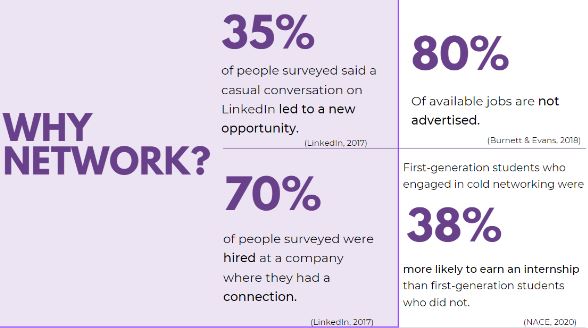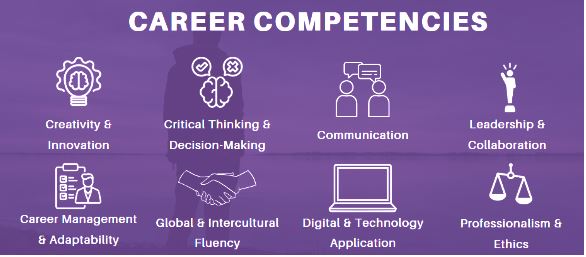We have compiled a few tips on career transitions for KATIE students who are pursuing a degree while striving to switch industries or get a promotion!
If you would like support in developing an action plan to make concrete goals for your career exploration, you can schedule an appointment with our CFA / Grad Career Specialist, Teresa Butel. If you feel uncertain about making a career transition, check out this webinar with tips about how to approach this difficult decision from Monica Dillon Huntsberry (Alum ‘88). If you already feel confident in your decision to transition, check out the tips below:
- Research real positions.
Before you’re ready to start applying for jobs, it’s good to still start researching open positions and networking with professionals who have positions that you are curious about. This research will help you narrow down what jobs may be a good fit.- O’net
If you are not sure what job titles to search, you can search by industry on this site from the Bureau of Labor Statistics that compiles information about jobs across the United States. Each page will give you examples of typical tasks, average pay (by zipcode), AND examples of job titles that you can search on job boards to find real postings. - Job postings via job boards
Find a couple of job boards that you can check regularly and then collect notes on skills that are listed the most often in job postings that appeal to you. Consider if you already feel confident in these skills; if not, make a plan for how you can continue building these relevant skills in class or through your current work. - Network via PeopleGrove, LinkedIn, or events with employers
Search for alumni with the degree that you are pursuing, people in your existing personal and professional network, and/or professionals who work at organizations that appeal to you and review their career paths. Again take note of any skills that are frequently listed. You can also reach out and ask to schedule an informational interview so you can chat and learn more about how they got to their current position, and what steps they’d recommend.
- O’net

- Test it out!
You often don’t know if you’ll like the new responsibilities that come with a switch to a new industry, or even a promotion in the same industry, until you try it. Classes will help you determine if you’re interested in the subject but there are often multiple kinds of jobs and tasks that your new degree could lead you to, and trying out those possibilities in a small way before you apply to jobs will help you make the best decision about a good fit.
- Ask your faculty about conferences that you can attend so you can learn about a lot of job possibilities within the industry and network with professionals there.
- Volunteer at events or apply to internships within the industry that you are curious about – for some students, clinical or internship experiences will already be built into your degree!
- If you are already working a job, consider what training or professional development you can access through your current workplace that provides transferable skills for your desired promotion or new industry and then sign up for those opportunities.
- If you are already working a job, you may also have the ability to take on some different projects or join a committee in your workplace or at school that allows you to focus on building skills that you’ve identified will be relevant.

If you want reflective exercises to help you generate ideas about your career, the Stanford School of Engineering offers a free, asynchronous course called “Designing Your Career” or you can read the related book “Designing Your Life: Build a Life that Works for You” by Bill Burnett and Dave Evans.
- Highlight transferable skills in your application.
Once you have narrowed down options and feel ready to start applying, you’ll need to prepare application materials (resume, cover letter, networking platform accounts, etc). You want these materials to demonstrate that you meet all the qualifications listed in a job’s position description and if it’s a promotion or a new industry where you do not yet have experience with all the types of responsibilities listed, then you must demonstrate transferable skills that will allow you to meet those new responsibilities.- Career Competencies
The National Association of Colleges and Employers (NACE) has conducted research to determine the top 8 types of skills that employers across all industries look for in candidates. The competencies include: Communication, Leadership & Collaboration, Critical Thinking & Decision Making, Creativity & Innovation, Professionalism & Ethics, Digital & Technology Application, Global & Intercultural Fluency, and Career Management & Adaptability. These are important skills to highlight because they’ll transfer to any industry! It is recommended to include these interpersonal competencies in descriptions of your past work experience, along with concrete examples of how you have developed them, over simply listing the terms in a “Skills” section.
- Keywords (Job Postings, Professional Associations, O’net)
The absolute best place to choose keywords to include in your resume is from the specific position description for a job that you are applying to; yet, if you do not have time to tailor a resume for each job then still ensure you are matching industry-specific language. The more you match the specific language in a job posting, the more time you save HR in determining whether or not your descriptions of past work match the qualifications that they’ve listed! Great places to find industry-specific keywords are professional associations and O’net. - Leverage your Cover Letter
Even if a cover letter is not stated as being required, when you are transitioning to a new industry it is a good idea to include a cover letter that can expand on your resume to share more about what prompted you to make this career transition and how transferable skills will equip you to succeed.
- Career Competencies

Career transitions are challenging, especially if they involve a potential move, salary impact, or otherwise affect additional people in your life. Getting one foot in the door and testing out a new type of work will hopefully help you feel more confident in the ultimate transition. Throughout the process, make sure to give yourself credit for all the previous experiences you’ve had and the skills that you’ve developed which have prepared you for this next chapter – your confidence is key in communicating how you are qualified to potential employers.
If you would like support in your career transition, please schedule an appointment with our Career Development office!
For additional resources, check out the following:
- The Muse Career Change article hub
- Career Force Career Change resources

